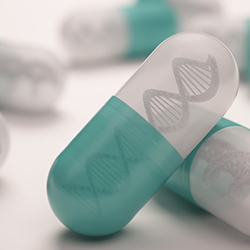My Outlook on DNA Banking
A Blog from Jay Kaplan, COO and Founder of FGen
I talk to a lot of people about DNA Banking and FGen. Without fail, everyone seems to ask the same couple follow up questions, so I decided to craft these questions and answers into my first monthly blog for FGen. DNA Banking is a new idea; to some it seems like something they would see in a sci-fi movie, something thats a bit "out-there". Others see the potential this will have for humanity, and you can see the light bulb switch on in their eyes. Others are still skeptical, focusing more on the "why?" or the "why now?". Hopefully I can shed some light on these questions, and turn a few agnostics into believers.
A great way to think about DNA Banking is as a metaphor: by comparing it to insurance. At FGen, we've termed DNA Banking as the "ultimate insurance policy". Wearing a seat belt while driving a car is micro-insurance. On a day to day level, we wear seat belts not because we plan to get into an accident every time we get into the car, but because it a small precaution, pretty noninvasive and free, that one day might genuinely save our lives if disaster should strike.
Buying a life insurance policy is macro-insurance. It's something we pay for every month, a large scale dollars and cents precaution, so that our family is taken care of should disaster strike. Through these prisms, it's clear that it's better to have it and not need it, then to suddenly have a need, but not have it. Here are a few "needs", or uses for DNA Banking.
1. Regenerative Medicine
Regenerative medicine is one of the biggest breakthroughs that is likely to take place in the next decade. Scientists are working on regrowing organs in a lab, from your own cells, to obviate the need and wait-time for donor organs. There are several fascinating articles on this subject in our Research Tab. If you haven't yet read them, I would highly recommend checking them out. Presently, step 1 in regenerative medicine is the use of stem cells to create the scaffolding that will ultimately be a working organ. In the US especially, stem cells can cause some ethical debate. As this technology advances, a simple DNA sample will provide the same function as the stem cell, and serve as the building block for a regrown organ.
2. Testing
There are a wide variety of DNA tests that are currently available to the public. From ancestry testing, and finding out the journey our ancestors took to arrive at the present, to genetic testing to discover what diseases our genetics have predisposed us to, and to general paternity testing ALL of these tests start with a DNA sample.
3. Identification
Identification of a DNA sample is an unfortunate, but necessary need in law enforcement, and in forensic investigation. If there is ever a missing person, law enforcement will use DNA samples to trace clues, beyond any reasonable doubt to hopefully locate the missing person. If someone works in a high risk profession, a DNA sample will be the standard of identification.
4. Study
There are clues in our DNA: recessive traits, disease predispositions, mutations that are unique, and are based on the DNA found in our family tree. 75% of diseases can be traced to our genetic heritage. By studying our DNA, we can study ourselves: our past and our future, to take preventative measures, make healthier life choices, make specific choices about our personalized healthcare, and ultimately lead a more educated, less risky lifestyle.
5. Preservation
Our DNA is the "patchwork quilt", the "unique genetic fingerprint", the genetic traits that make us who we are. Post mortem, this patchwork is lost to time. For someone with few or no medical options, preserving a DNA sample will provide family the peace of mind that a part of a loved one will endure forever.
We have no concept for where science and healthcare will advance over the next few decades; what fictions will become realities. We have no idea where life will take us. The one certainty is that with a stored DNA sample, all scientific doors are open, and will remain open regardless of what should happen in day to day life. And remember, it's always preferable to have it and not need it, than to need it and not have it.
 securely store your DNA now
securely store your DNA now


